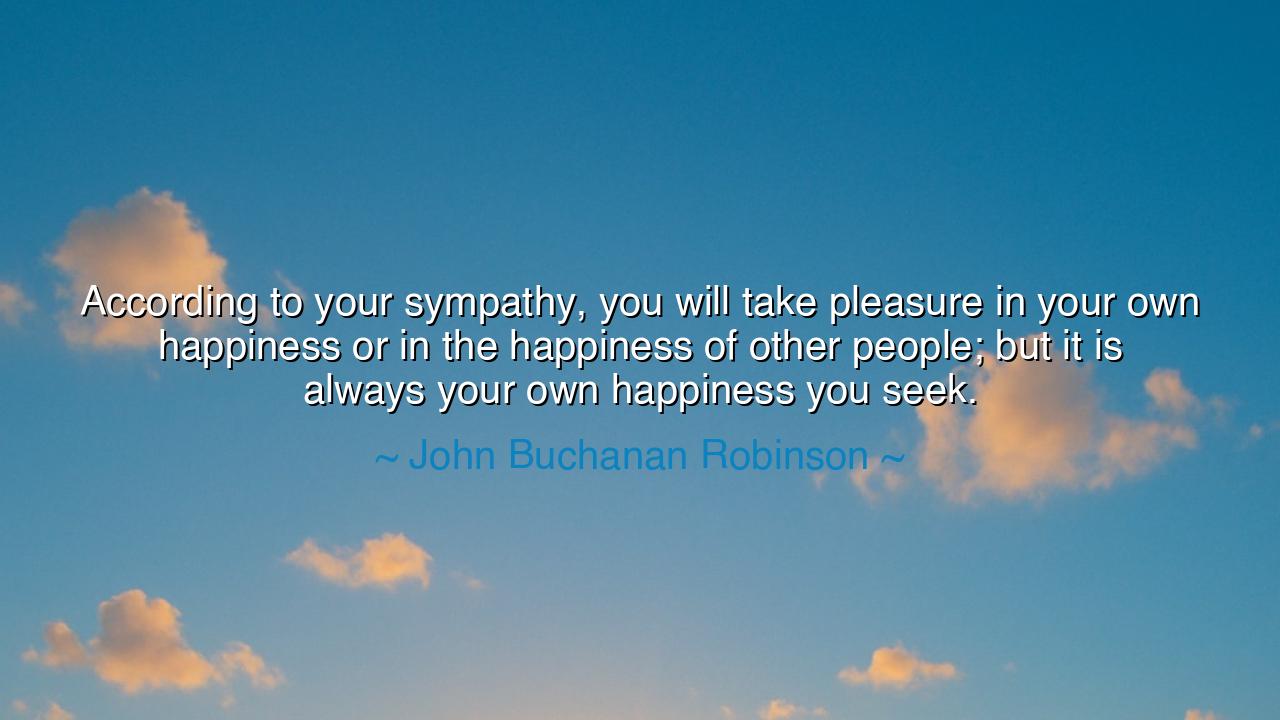
According to your sympathy, you will take pleasure in your own
According to your sympathy, you will take pleasure in your own happiness or in the happiness of other people; but it is always your own happiness you seek.






Hear the words of John Buchanan Robinson, statesman and thinker, who declared: “According to your sympathy, you will take pleasure in your own happiness or in the happiness of other people; but it is always your own happiness you seek.” At first glance, these words may appear stern, even cynical, but within them lies a profound truth about the workings of the human heart. For he reminds us that whether we delight in ourselves or rejoice with others, the wellspring of our joy flows always from the same source—our own sense of happiness.
The meaning of this saying is that all human beings, however noble or generous they may seem, are bound by the pursuit of their own fulfillment. To the selfish, sympathy is narrow, and they find joy only in their own pleasures. To the compassionate, sympathy is broad, and they find joy in the prosperity and peace of their neighbor. Yet in both cases, Robinson insists, it is still the seeker’s own happiness that is being pursued. The difference lies in the range of sympathy—whether it encloses only the self, or whether it expands to embrace others as part of that self.
Consider the tale of Marcus Aurelius, emperor and philosopher of Rome. He understood that to live for the happiness of others was also to secure his own. When plague and hardship afflicted his people, he did not retreat into the comforts of the palace but sought to govern with justice and mercy. His sympathy was broad, and in their well-being he found peace for himself. Yet his actions still followed the truth of Robinson’s words: his joy came not from denying himself utterly, but from the recognition that his happiness was bound up with theirs.
Contrast this with the tale of Louis XIV, the Sun King of France, who delighted in his own grandeur and in the splendor of Versailles, but gave little thought to the suffering of his peasants. His sympathy was narrow, directed only inward, and thus his happiness was fragile, propped up by vanity and display. When famine struck, when war drained the treasury, his people cursed his name. His personal pursuit of happiness, divorced from the happiness of others, became his undoing. In this contrast, we see the wisdom of Robinson: all seek happiness, but the width of sympathy determines whether that pursuit builds or destroys.
The lesson is not to condemn the pursuit of happiness, but to enlarge it. If one’s sympathy extends only to oneself, joy is fleeting and fragile, easily overturned by loss or loneliness. But if one’s sympathy reaches outward, to family, to neighbor, to the stranger in need, then one’s happiness becomes more secure, for it is shared. To rejoice in the happiness of others is to multiply one’s own joy, while to hoard it only for oneself is to shrink the soul.
Practical action follows: examine your heart and ask—Where does my happiness come from? If it comes only from possessions or personal victories, expand your sympathy. Rejoice in the success of a friend, delight in the laughter of a child, take comfort in the peace of your community. In doing so, you are not denying yourself happiness, but broadening its reach, allowing it to flow more abundantly into your life.
So let Robinson’s words be remembered not as a rebuke, but as a guide. Sympathy determines the measure of our joy: narrow sympathy yields narrow happiness; wide sympathy yields abundant happiness. Always, it is our own happiness we seek—but by choosing to bind it with the happiness of others, we elevate it, purify it, and make it enduring. In this way, the pursuit of self and the love of others are not enemies, but allies in the eternal quest for joy.






AAdministratorAdministrator
Welcome, honored guests. Please leave a comment, we will respond soon